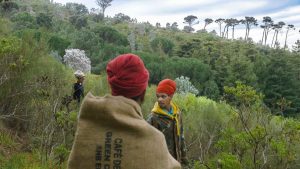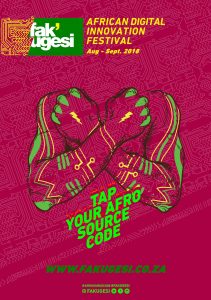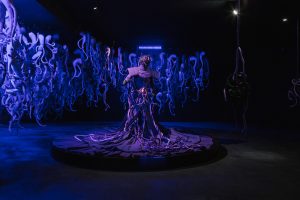Motlatsi Khosi (MK): “The People versus the Rainbow Nation†is a striking title that draws one deeply to this trailer. It suggests, to those who recognize its South African meaning, that all is not right for citizens. This title speaks to the growing disillusionment sweeping this country. From service delivery protests, to striking municipal workers and the latest, student protest movements. What role do you see this documentary playing in this growing movement facing the nation?
Lebogang Rasethaba (LR): I think the film, and also if you think about the primary function of the medium, reflects the times. So maybe it won’t add anything to the movement in terms of energy or whatever, like I don’t believe people watch a film and then go protest fees structures, but it will give some insight into what it means, or rather what it feels like to be a young person navigating the aligning vectors of power in society. That’s really what the film is about, it shows how all the current socio-political climate affects the young people in the film differently.Â
3. The trailer is tremendously captivating. It features words of anger and frustration from those not happy with the country Mandela left behind. Yet it also features images of young people, those presumably studying towards their degree, talking about politics and the state of the nation. What is it that you are hoping viewers, both local and international to take away from your documentary? What is it that you want them to learn about the issues being faced by students and their movements in South Africa?
Here’s the thing, this film isn’t some champion for the voiceless… I think what’s really dope about the current narrative amongst young people in SA right now is that there is a lot of authorship, a lot of the things you will hear in the film people all the world over have probably heard before. Young people are very clear, vocal and very articulate about their positions. So audiences aren’t going to learn anything because we know what racism is, we know what sexism is. We know what classism is, we know all this but they might gain some perspective because its always more impactful when the dialogue isn’t happening in the acrimonious comments section. Maybe the film presents those voices into a cohesive narrative in a filmic way that hasn’t been done before, maybe.
MK: South Africans are no strangers to the global structures and economic forces and are no strangers to international cultural trends. MTV is apart of this growing international influence that has even formed its own branch within our shores as MTV Base. How was this relationship formed between you and this media powerhouse and what role have they played in the direction of this production.
LR: One of the producers at MTV called me up and they told me that they wanted to give a young filmmaker a platform to voice his views on what’s happening in South Africa right now. They were really cool to work with because they didn’t interfere with the process or demand anything really, once we agreed that the film should interrogate the rainbow nation I never heard from them again. They kinda let me do what I wanted to. When I showed them the first cut they were like, I paraphrase, “fuck this is kinda different from what we imagined, its intense…we need to re-think and re-align our strategyâ€â€¦.you get what I’m saying here right? They had to retrospectively change their campaigns and strategies and whatever so they could align with the film. Imagine!Â
“The People versus the Rainbow nation†airs today at 21h15 on DSTV channel 130. You can also watch the film tonight at a viewing party at Chalkboard Cafe in Maboneng.





